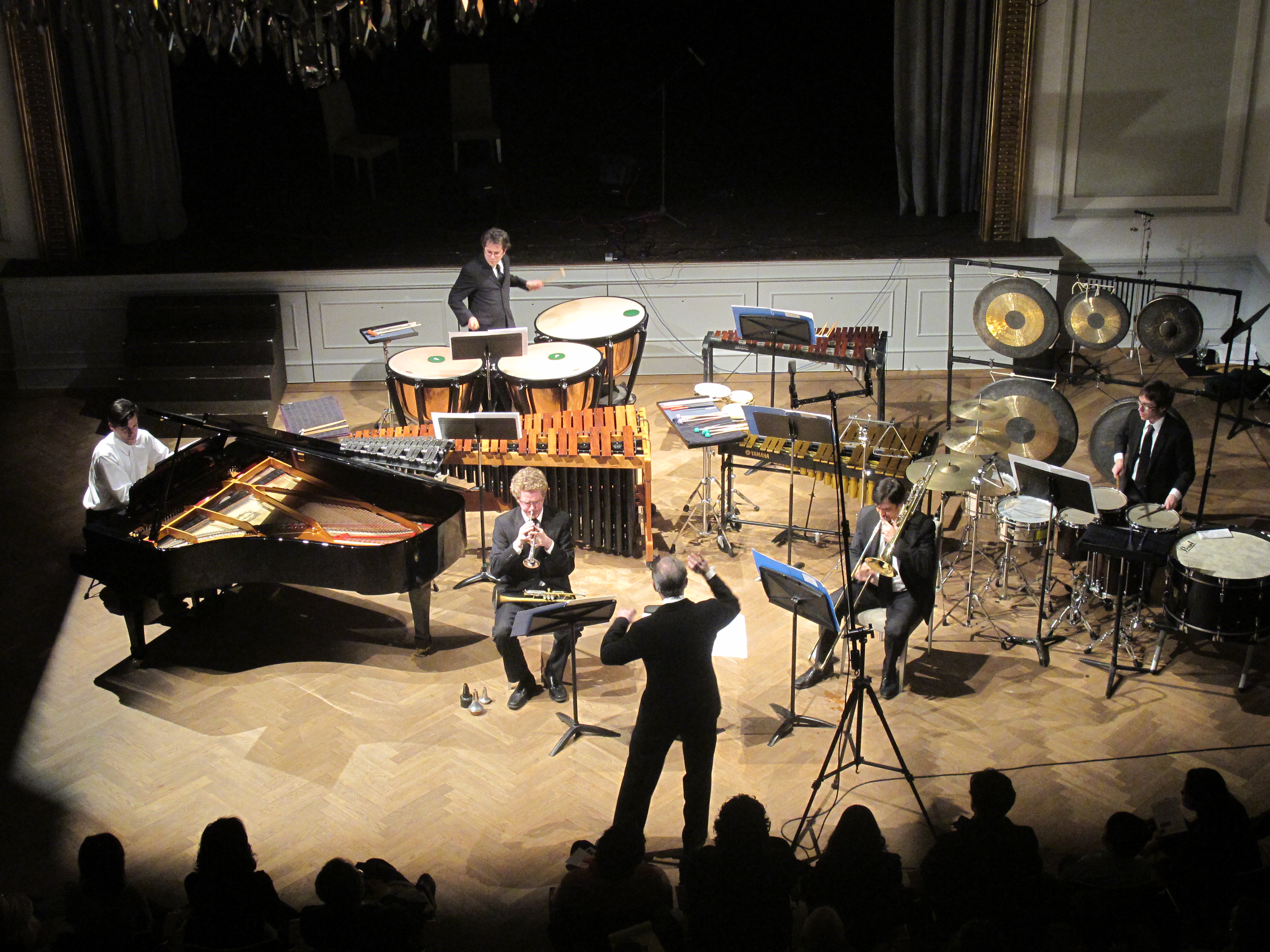Other Links
Editorial Board
- UK Editors
- Roger Jones and John Quinn
Editors for The Americas - Bruce Hodges and Jonathan Spencer Jones
European Editors - Bettina Mara and Jens F Laurson
Consulting Editor - Bill Kenny
Assistant Webmaster -Stan Metzger
Founder - Len Mullenger
Google Site Search
SEEN AND HEARD
INTERNATIONAL
CONCERT
REVIEW
Unsuk Chin : Allegro ma non troppo (1994/1998, New York Premiere)
Unsuk Chin : ParaMetaString (1996, New York Premiere)
Unsuk Chin : Etudes for Piano
II. Sequenzen (1995, rev. 2003)
IV. Scalen (1995, rev. 2003)
VI. Grains (2000)
V. Toccata (2003)
Unsuk Chin : Fantaisie Mécanique (1995, rev. 1997, New York Premiere)

James Baker conducts the Talea Ensemble in Unsuk Chin's Fantaisie Mécanique
Photo courtesy Korean Cultural Service
Even in her recent and most acclaimed works-the Violin
Concerto, the opera Alice
in Wonderland-seductive timbres never quite conceal the double
nature of Unsuk Chin's musical voice. It is an animating quality-a
near and far, a within and without, an I and thou-and yet her
counterpoint stirs up a desire for unity of person and place. As she
finds new ways to reconcile widely divergent musical influences, her
sound trembles between the hum and echo of different cultures. Her
use of percussion, for instance, combines a fleeting sensation of
the Balinese gamelan with a memory of the European symphony
orchestra. Her refined harmonies summon a tranquility that modern
life unsettles. While many culture-hopping composers respond to
similar feelings of displacement by merging non-Western, folk, and
popular genres into their music, her achievement is to work entirely
within a modernist idiom.
But this double nature, sonorous and subtle in Ms.Chin's new
compositions, was formerly discordant and agitated. This
restlessness was expressed with impressive skill and dedication by
the Talea Ensemble, along with the excellent pianist Taka Kigawa, in
a concert presented by Korean Cultural Service devoted to works by
Ms. Chin, mostly from the 1990s. The program, at Bohemian National
Hall, opened with Allegro
ma non troppo, a psychologically tense solo for amplified
percussion and recording. The percussionist, Alex Lipowski, played
with his usual virtuosity. He also was called upon to inhabit this
domestic nocturne as if an actor playing a role. With verve and
understanding, he ripped open a cardboard box, pulled out colored
tissue paper (later used to create sounds), struck instruments with
household implements-feather duster, fork, ticking clock, drinking
glass-and mallets, all doubled by the same sounds previously
recorded and heard from speakers. The result evoked the daytime
clatter of home rattling around a sleepless mind-a crescendo of
pent-up dissatisfaction ending abruptly as Mr. Lipowski crushed
tissue paper into a ball and threw it into the audience.
The drama was followed by a sharp examination of musical elements
for amplified string quartet and recording, ParaMetaString,
which studied, in four movements respectively, tremolo, pizzicato,
legato, and col legno. In other hands, it might have been sterile,
but Ms. Chin has an uncanny ability to invest the contrast between
acoustic and electronic sounds (the acoustic sounds recorded, and in
this case, processed) with interest and emotional weight. Hearing
the piece was like looking at music though a microscope; but seeing
a small part of something large is disorienting. In this way, the
components of music felt clear and mysterious at the same time. An
intense metallic trill, for instance, magnified the facts of
oscillation but also sounded like a cimbalom, suggesting Ms. Chin's
fraught relationship with her teacher, Ligeti. The irony was
illuminated during an in-concert discussion between Ms. Chin and
Anthony Cheung, Talea's artistic director. Ms. Chin also elaborated
on her Presbyterian upbringing in South Korea, studies and long
residence in Germany, and her growing sense that, culturally and
emotionally, she is Korean.
A selection of four piano etudes, performed with clarity and
grace by Taka Kigawa, followed. In Sequenzen, Scalen,
andGrains, Mr. Kigawa etched repeated notes, overtones, and
scales as if they were pastoral images, and not finger-twisting
exercises. In Toccata he
separated and blended voices into a chorus of bird-like song. The
concert ended with Fantaisie
Mécanique, nimbly played by the Talea Ensemble, which has
quickly come to seem indispensable to the New York City new music
scene. Throughout this exuberant chamber work, the trombone
repeatedly tempted piano, trumpet and percussion to slide, bend, and
wobble into a mood of raucous improvisation, but reassuring balance
was attained between the colors, textures, and rhythms of modernist
decorum and enigmatic spontaneity. That once again I heard a tension
between two different ways of being in Ms. Chin's music did not come
as a surprise. Her sound brings to mind a quality of apprehension,
both as dread and as understanding.
